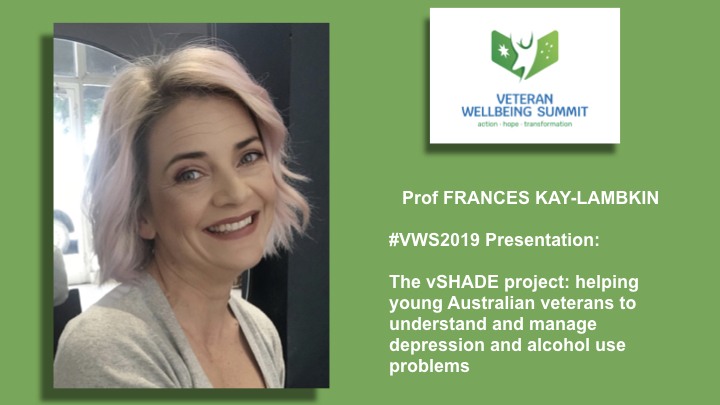The vSHADE project is being run by the University of Newcastle, funded by Defence Health Foundation, and approved by the Department of Defence/Department of Veteran Affairs Human Research Ethics Committee. Importantly, the project is designed to offer younger veterans, aged 18- 45 years access to a private, online support service (SHADE) that aims to help improve symptoms of depression and reduce problems associated with alcohol use.
In addition, vSHADE also provides younger veterans with access to a private, anonymous, app-based social network where they can connect with others across Australia with similar experiences and concerns. The network is moderated by vSHADE clinicians and veterans who understand some of the challenges in transitioning to civilian life. This presentation will describe the vSHADE project, and our experiences to date in supporting veteran mental health and wellbeing. Although there are effective treatments available to support the mental health and wellbeing of veterans, research indicates that many do not receive treatment, or receive treatment following lengthy delays, during which the health, social (including family), and work consequences can accumulate. Barriers to accessing health information and treatments for mental health and alcohol/other drug use problems include distance and remoteness from services in rural or remote areas, as well as stigma associated with seeking help (especially for mental health problems, especially among males, and particularly among younger veterans). The younger veteran community, whilst sharing many commonalities with their older colleagues, report increasing expectations for patient-centred, holistic, and connected care. Central to this, is an emphasis on technology, such as telemedicine and smartphones, as the uptake of smartphone and other related technology is wide in the younger veteran population. The vSHADE project is significant, as it is a trial of an online, self-paced and clinician-assisted mental health interventions, with an overall goal of providing an evidence base for new models of service delivery for veterans affected by mood and alcohol use problems. It will provide important insights to guide future implementation of programs designed to support veterans in addressing alcohol use, or mental health problems. The success of implementing an online program like vSHADE may provide new and cost-effective avenues for reaching those in need, particularly when issues of stigma may be a barrier to service use, remote locations or with limited access to more traditional forms of treatment. Thus, the vSHADE project is a key strategy to encourage young veterans to take action on their mental health and wellbeing, and to transform the way in which they reach out and engage with services to support their mental health and wellbeing.
This webinar took place 2 PM on Tuesday, 27 August 2019
More about Prof Kay-Lambkin
Prof Kay-Lambkin (BSc(Psych) Hons PhD) leads an international team of researchers, clinicians, and industry partners in innovative development and translation of evidence-based treatments for comorbid mental and physical disorders, which is internationally recognised for its impact, research quality, and significant translational value. She is a registered Psychologist, NHMRC Senior Research Fellow at the Priority Research Centre for Brain and Mental Health, University of Newcastle (UON, 2016-2020), and Director (Technology, Innovation, Translation) for the NHMRC Centre for Research Excellence PREMISE (2018-2022). Her computerised treatment program for depression and alcohol/substance use (SHADE, 34 million Americans) has been recognised as a leading digital program by USA Substance Abuse and Mental Health Services Administration National Registry of Evidenced-based Practices (2015), and was 1 of 6 digital tools for addiction endorsed in 2016 US Surgeon General’s Report on Alcohol, Drugs, & Health for: ‘1) increasing access to care in underserved groups; 2) making time for service providers to care for more clients; 3) providing alternatives to in-person treatment; 4) increasing the chances that treatments are delivered as intended; and 5) decreasing costs’.

